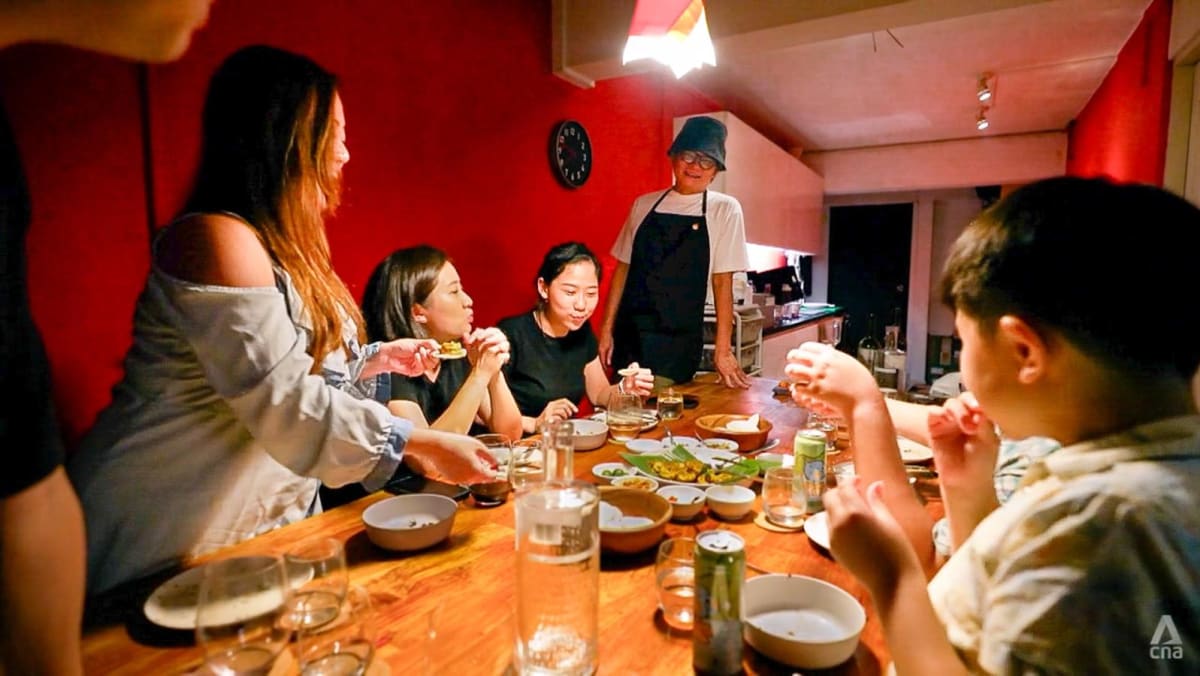NAVIGATING THE RULES
As with other businesses under Singapore’s Home-Based Business Scheme, food and beverage sellers do not require approval or any Singapore Food Agency (SFA) licence to operate. But they remain bound by food safety standards.
The guidelines in place, however, can leave some of them feeling uncertain, for example when home cafe owner and micro-roaster Chen Delun, 40, considered upgrading to a larger machine to double his output.
A small cafe had approached him to supply it with roasted beans weekly, which he estimated could add around S$1,500 to his monthly revenue from running Spilled Roaster & Brews in his Tampines five-room flat.
While the SFA prohibits home-based sellers from supplying businesses, Housing and Development Board (HDB) guidelines also ban heavy equipment as that would not be for domestic use.
“But what’s considered a commercial machine?” Chen began to wonder. “Is it the size? Is it the exhaust output? The noise?”
Asking the HDB for clarification did not provide a clear answer. He has since turned to e-commerce, posting his beans in small batches directly to customers across the island.
“I can expand my market range,” he said. “And mailing is very cheap.”
WATCH: My micro cafe and roastery in my HDB flat after being retrenched (12:43)
Another limitation under current rules for residential premises is that shopfront signage, which could attract walk-in customers, is forbidden — much to Chia’s consternation. During her opening week, she was advised by CNA’s producers to bring her signage indoors.
“I wanted people to sometimes walk past … and realise there’s coffee and matcha here. I’ll just keep my doors open,” said the barista. “But I also hope that for home-based businesses, (the authorities) won’t be so strict (with) us.”
BEING MINDFUL OF NEIGHBOURS
As the authorities do not actively monitor home-based businesses, enforcement typically begins with neighbours’ complaints. Ng, the private dining chef, learnt this early when his neighbours objected to him barbecuing meat in the common corridor.
Town council officers stepped in, and he had to adapt. Today, he cooks in his utility room, using a makeshift vent to redirect smoke and adjusting the barbecue process too.
“Hot and fast barbecuing will create a lot of fire and smoke, so I designed … a low and slow approach, which requires a longer time,” he said. His pork ribs, for instance, take four hours to cook.
As for Chen, being mindful of the neighbours is part of the business strategy. He usually roasts his coffee beans on Monday mornings, when most residents are at work. And he only accepts customers by appointment.
“I don’t allow walk-ins because it’s a bit hard for me to manage the crowd, and I don’t want people to be crowding outside,” he said.
Without physical visibility, social media and word of mouth have become lifelines for these micro-businesses hoping to be discovered by new customers.
Kim recalled how his hairdressing salon barely had patrons when he was not active online. Today, he posts on Instagram and TikTok regularly.
He has also collaborated with other entrepreneurs nearby to provide referrals. “Next time I’ll bring my wife,” he told a neighbour running a home-based eyelash extension service. “Then if you come to my salon, I’ll give you a special discount.”
As a business owner also seeking to build such connections, Chen sees a “digital kampung” coming to the fore. “Sometimes we gather, we share information, we barter,” he said. “You give me cake; I give you coffee. It’s very fun.”
Watch the On The Red Dot series Hustle In My HDB here. The programme airs on Channel 5 every Friday at 9.30pm.













